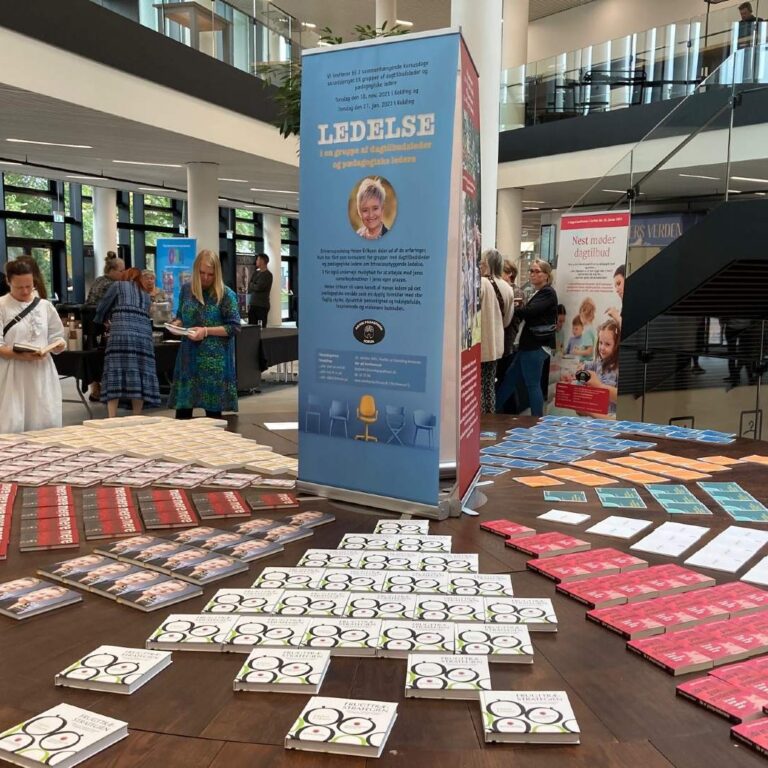Nearly two years of dealing with the coronavirus, significant upheavals, and extraordinary stress have naturally left us fatigued. Fortunately, the fog of the corona is lifting, and we find ourselves in a place where, by listening to our own experiences, well-being research, and making room for presence, tranquility, self-compassion, constructive conversations, and shared experiences, we can pave the way for more well-being, meaning, and greater job satisfaction.
If we delve into recent well-being surveys, it's not challenging to spot the exhaustion, fatigue, and dissatisfaction many employees and leaders are experiencing these days:
- One in five Danes assesses that their mental health deteriorated in 2021
(Kanter Gallup, february 2022). - Over half of Djøf's members have experienced physical symptoms of stress within the past two weeks (Djøf, October 2021).
- One in four private-sector leaders has felt stressed often or all the time in the last two weeks – a 40 percent increase since the start of the corona pandemic (Lederne, January 2022).
These numbers speak clearly, but we need to be mindful of how we interpret them. They do not indicate a lack of resilience or adaptability in employees or leaders. Not at all.
Instead, as I see it, they reflect that we are all human beings, psychologically and biologically affected when changes rage and uncertainty prevails, as has been the case during the corona period. And precisely because we are human and not machines – fortunately – it is important to acknowledge and accept exhaustion and fatigue in ourselves and others as a completely natural and human response.
Now is the time to focus on well-being, meaning, and job satisfaction
But fortunately, we are now in a place where the fog of the corona is lifting, and as individuals and organizations, we can be curious about what each of us and together can do to move forward, bringing more joy into everyday life – and less exhaustion, fatigue, and dissatisfaction. Perhaps there is a lot of learning in this, learning that can take us big steps towards the well-being paradigm that we, as employees, organizations, citizens, and society, urgently need, generally, and not just because we are now in the aftermath of a major pandemic.
A good place to start is well-being research. What exactly does the research say we, as employees and organizations, should focus on?
One thing we know from research is that job satisfaction and well-being increase when we, as employees and leaders, can unfold in an environment that allows for humor, laughter, recognition, and self-compassion. An environment where we have the opportunity to be curious about what makes sense to us, where we can give while growing from it – and can be open, honest, and present. A place where our words and actions are not met with hostility and criticism (Blackburn, 2019).
If we can check off several of these factors, we can actually measure well-being down to the DNA level, where the protective ends of our chromosomes, the so-called telomeres, become longer. This, in turn, means that we simply live longer and have fewer so-called lifestyle diseases.
And the longer the telomeres, the more our stress levels tend to decrease. At the same time, brain research tells us that, through practices like mindfulness, the opportunity for immersion, tranquility, and curiosity helps build more neural networks in the frontal part of the brain, the prefrontal cortex. This is the part of the brain we use to plan, navigate complexity, and enables us to observe ourselves from the outside in specific situations so that we can work and fight wisely – without being engulfed, losing perspective, and going under (Blackburn, 2019).
4 pieces of advice for employees, leaders, and organizations
The above is, of course, just scratching the surface of all the exciting things that research shows, and my lectures, courses, and books delve much deeper. The next crucial step is, of course, that the essences of well-being research increasingly reflect the way we individually and relationally think, act, and organize everyday life in the workplace.
As inspiration, I have gathered 4 points to keep in mind right now when many are naturally post-corona tired, and there is an urgent need to focus on what we learned from corona and how we can include this learning in our focus on what really makes sense, what really creates value, and why a high degree of employee involvement now and in the future is the key to sustainable well-being and motivation.
1. We need to avoid running faster – and instead "fight" wisely and consciously
When we feel like there's not much juice left in the lemon, there may be a natural inclination to escape. Alternatively, we could choose to focus on how we consciously fight for well-being. This involves, among other things, each of us as employees and leaders working to increase awareness of our own behavior and reaction patterns. By practicing observing ourselves and, from a conscious place, sensing, we give while growing from it, making sure to acknowledge each other, be curious and inquisitive. Responsibility is called responsibility in English, where part of the meaning is the ability to respond, and that is precisely the conscious responsibility that each of us can make an effort to take and unfold with wonder, curiosity, and open-mindedness, both individually and collectively.
2. Third gear is fine for now
Calmness, presence, and "seeing each other anew" are some of the most important things we can give each other when creating extra space for well-being and job satisfaction after a long period of extraordinary pandemic stress. Therefore, it is important, both collectively and from a leadership perspective, to accept that one can perform good and important work in the third gear – for a while. Our nervous systems need time to adapt to the many impressions that affect us when everyone is gathered again. By slowing down, which may not necessarily be equated with reducing efficiency, we also legitimize the opportunities for genuine good mornings, laughter by the coffee machine, and spontaneous recognition. And that is just what is needed right now.
3. Cultivate well-being-promoting dialogues
Externally, we may appear similar, but inside, many of us have changed after two years with the coronavirus. From a well-being perspective, it is crucial that we, especially at this moment, regularly check in with each other and prioritize good, empathetic, spacious, and present dialogues. Discussions should cover what currently brings us job satisfaction, what we grow from as we give, and what we have experienced and acknowledged during the pandemic. What have we missed? And what have we been happy about? What brought meaning and well-being? The latter especially involves a discussion of whether as employees and leaders, we necessarily have to work in the same way as before and how organizations can most effectively embrace diversity and accommodate different interests and needs.
4. And let's insist on learning... from the coronavirus!
Corona shattered the boundaries of what we thought was possible. Targeting, documentation, tightening, control, and surveillance were temporarily pushed to the sidelines because it simply was not possible to meet, grasp, and invent new ways of collaborating and innovating that worked. Remote work turned out to work for most people. Leadership became more facilitative in many workplaces. Space was created for employees' self-organizing abilities and creativity. Let us not just remember but insist on continuing to integrate and expand what worked really well and promoted well-being during the pandemic. If we do this, I believe we can take quantum leaps from our current dominant growth paradigm to a well-being paradigm, where the experience of meaning and job satisfaction can flourish. Acknowledging that well-being not only precedes growth but actually generates growth.











